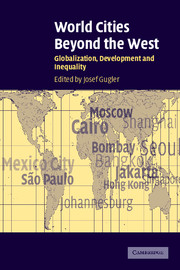Book contents
- Frontmatter
- Contents
- List of figures
- List of maps
- List of tables
- List of contributors
- Acknowledgments
- World cities beyond the West
- Introduction
- Part 1 The impact of the global political economy
- 1 Shanghai: remaking China's future global city
- 2 Seoul: complementing economic success with Games
- 3 Bangkok: evolution and adaptation under stress
- 4 Cairo: too many people, not enough land, too few resources
- 5 Mexico City in an era of globalization and demographic downturn
- Part 2 The impact of the state
- Part 3 The impact of popular movements
- Afterword
- Index
- References
2 - Seoul: complementing economic success with Games
Published online by Cambridge University Press: 12 October 2009
- Frontmatter
- Contents
- List of figures
- List of maps
- List of tables
- List of contributors
- Acknowledgments
- World cities beyond the West
- Introduction
- Part 1 The impact of the global political economy
- 1 Shanghai: remaking China's future global city
- 2 Seoul: complementing economic success with Games
- 3 Bangkok: evolution and adaptation under stress
- 4 Cairo: too many people, not enough land, too few resources
- 5 Mexico City in an era of globalization and demographic downturn
- Part 2 The impact of the state
- Part 3 The impact of popular movements
- Afterword
- Index
- References
Summary
The notion of “world city” has fascinated many national and urban politicians in the way that “global competitiveness” has enthralled corporate executives around the world. The pursuit of world city status has become part of election rhetoric and viewed as a challenging but worthwhile political project for most large cities both in the developed and developing worlds (W. Kim 1998; Machimura 1998; Olds 1995; Öncü and Weyland 1997; Todd 1995). There has, however, been more confusion than agreement on how the term should be defined and how a city could achieve the status of a world city (Hill and Kim 2000). Many have tried to identify the social, economic, and cultural characteristics that distinguish the leading world cities, London, New York, and Tokyo, from the rest (Beaverstock et al. 2000; Budd 1999; Sassen 1991), although it is arguable whether the common ground among these top three can be translated into what it takes to be a world city. Few cities around the world can even dream of housing the globally known stock markets, corporate headquarters, bankers, lawyers, and real estate developers that have made the three world cities so special. There has been a growing body of literature examining what the second-, third- or lower-tier world cities have and dream of having (Dick and Rimmer 1998; Lo and Yeung 1996; Short and Kim 1999; Short et al. 2000; Yeoh 1999).
- Type
- Chapter
- Information
- World Cities beyond the WestGlobalization, Development and Inequality, pp. 59 - 81Publisher: Cambridge University PressPrint publication year: 2004
References
- 7
- Cited by



